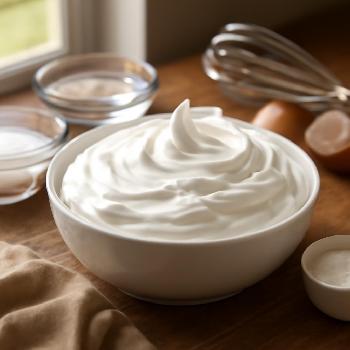Desserts > Dessert Sauces & Toppings > Topping Recipes > Meringue Recipe
Italian Meringue
A stable and glossy meringue made with hot sugar syrup, ideal for frosting cakes and pies.

Ingredients
- 4 Egg Whites
- 1 cup Sugar (for syrup)
- 1/4 cup Water
- 1/4 cup Sugar (for whites)
- 1/4 tsp Cream of Tartar
Prepare the Egg Whites
Place the egg whites and cream of tartar in the bowl of a stand mixer fitted with the whisk attachment. Have the sugar (for the whites) measured and ready.
Make the Sugar Syrup
In a saucepan, combine the sugar (for the syrup) and water. Bring to a boil over medium-high heat. Cook, without stirring (you can swirl the pan gently), until the syrup reaches 240°F (115°C) on a candy thermometer. This is the soft-ball stage.
Whip the Egg Whites
While the sugar syrup is cooking, start whipping the egg whites on medium speed until soft peaks form. Gradually add the sugar (for the whites) and continue whipping until stiff, glossy peaks form.
Pour in the Syrup
Once the sugar syrup reaches 240°F (115°C), remove it from the heat and slowly pour it in a thin, steady stream down the side of the mixing bowl while the mixer is running on low speed. Be careful not to pour the syrup directly onto the whisk, as it will splatter.
Continue Whipping
Increase the mixer speed to medium-high and continue whipping the meringue until it is cool to the touch and very stiff and glossy. This will take about 5-10 minutes.
Use Immediately
Use the Italian meringue immediately to frost cakes or pies. You can also pipe it onto baking sheets and bake at a very low temperature (around 200°F/95°C) to make meringue cookies.
Nutrition Facts Estimated per 100g of product
Calories: 200-250, Carbohydrates: 50-60g, Fat: 0g, Protein: 2-3g. Note: These values are approximate and may vary based on specific ingredient amounts.
Other Important Considerations for Nutrition
Italian meringue is primarily sugar. Consume in moderation as part of a balanced diet.
FAQ
-
Why is my meringue not stiff?
Meringue not stiff can be due to several reasons: fat or yolk in the egg whites, not whipping the whites long enough, or not using a clean bowl and whisk. Make sure everything is perfectly clean and fat-free, and whip the whites until stiff, glossy peaks form. -
Why is my meringue weeping?
Weeping meringue is often caused by undercooked meringue or humidity. Make sure the sugar syrup is cooked to the correct temperature (240°F/115°C), and bake meringue cookies in a low oven to dry them out completely. Avoid making meringue on humid days. -
Can I flavor Italian meringue?
Yes, you can flavor Italian meringue with extracts like vanilla or almond, or with citrus zest. Add the flavoring after the meringue has cooled slightly.
